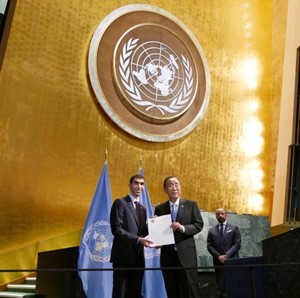 The United Arab Emirates today formally joined the Paris Agreement, following the Cabinet’s approval on the 4th of September 2016. H.E. Dr. Thani Al Zeyoudi, UAE Minister of Climate Change and Environment, deposited the UAE’s instrument of ratification during the High-level Event for the Entry into Force of the Paris Agreement, which was convened today by the United Nations Secretary General in New York, following the Cabinet’s approval on the 4th of September 2016.
The United Arab Emirates today formally joined the Paris Agreement, following the Cabinet’s approval on the 4th of September 2016. H.E. Dr. Thani Al Zeyoudi, UAE Minister of Climate Change and Environment, deposited the UAE’s instrument of ratification during the High-level Event for the Entry into Force of the Paris Agreement, which was convened today by the United Nations Secretary General in New York, following the Cabinet’s approval on the 4th of September 2016.
“The Paris Agreement is the world’s first truly durable response to climate change. It allows each country to contribute climate actions in accordance with their own economic and development priorities. For the UAE, this means solutions which create new social and economic opportunities and support our ambitious agenda towards economic diversification,” said H.E. Dr. Al Zeyoudi.
During the New York visit, H.E. Dr. Al Zeyoudi also held meetings with Patricia Espinosa, the Executive Secretary of United Nations Framework Convention on Climate Change (UNFCCC), and H.E. Hakima Al Haite, Minister of Environment and Morocco’s High-Level Champion. H.E. Dr. Al Zeyoudi reiterated the UAE’s support to the UNFCCC process and to ensuring successful outcomes at the upcoming Marrakech Climate Change Conference, which will be held in November 2016.
In June, the Ministry of Climate Change and Environment began developing the UAE National Climate Change Plan, which will set a national framework for climate action. The Climate Change Plan is being designed in consultation with government, business stakeholders, academia and civil society organizations and will prove that climate action can go hand in hand with increased economic growth and development.
The UAE is playing its part to tackle climate change, with effective policies and initiatives that aim to diversify the economy into new, knowledge-based industries. It has led the region in deploying clean energy, with pioneering projects and policies in renewable and nuclear energy, energy and water efficiency, and carbon sequestration an was the first in the region to set a clean energy target, of 24% by 2021. It has also deployed energy-saving infrastructures, from strict green build codes to world-class light rail and metro systems.
The country has long been investing in human capital for future industries, with world-class innovation centers, such as the Masdar Institute of Science and Technology. Over the next five years, it will double its investment in clean energy research and development. The UAE is also supporting international action, through renewable energy aid and investments in a number of international commercial renewable energy and is the proud host country of the International Renewable Energy Agency (IRENA).
When it comes to mobilizing resources to fund green projects the UAE is promoting sustainable finance and is hosting the 14th Global Roundtable of the United Nations Environment Programme Finance Initiative (25-26 October 2016) to build capacity within the country and to contribute to the global discussions. The UAE is also a member of the International Partnership for Blue Carbon, which aims to accelerate conservation and research on coastal blue carbon ecosystems, such as mangroves and sea grasses that play an important role in mitigating climate change by sequestering and storing carbon.
The UAE delegation comprised of Ministry of Foreign Affairs and International Cooperation, Ministry of Climate Change & Environment, UAE Permanent Mission to the United Nations, Dubai Land Department and Majid Al Futtaim Group.


